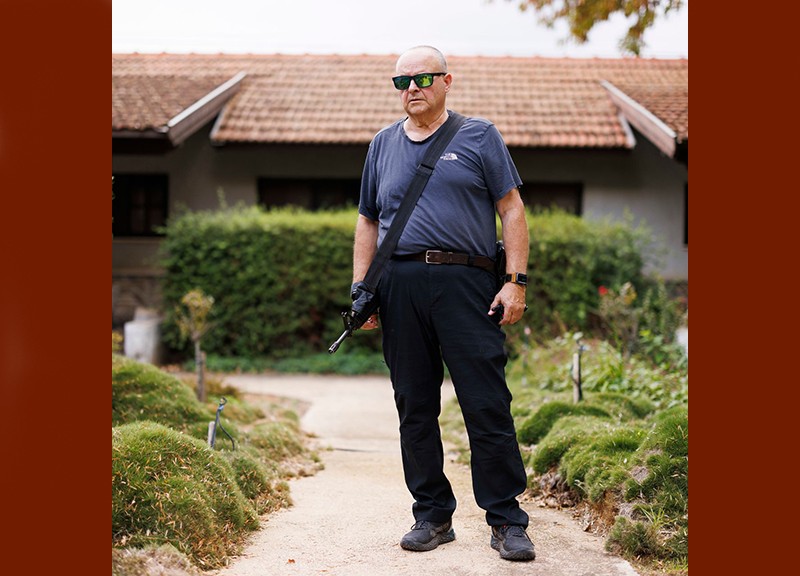
Prime minister resists demands to take action at tense Lebanon border, while issuing warnings to Iran-backed force
By Dion Nissenbaum and Ari Flanzraich - WSJ
LEHAVOT HABASHAN, Israel—In the days after the Oct. 7 Hamas attacks in southern Israel, Orna Rayn searched frantically for someone to build a wooden barricade to secure the door of a safe room in her house about 6 miles from the Lebanon border.
Rayn’s sister, Einat Rothem-Nechushtan, moved into the safe room on Oct. 10, even before the Israeli government ordered the evacuation of her own small farming community in northern Israel because of fears of war with Hezbollah, the Iranbacked army in Lebanon.
For weeks, the southern Lebanon hills less than 2 miles from Rothem-Nechushtan’s home in She’ar Yashuv have become an undeclared second front for the Israeli military, while it tries to rout Hamas fighters from the Gaza Strip 165 miles south.
The sisters have mapped out a plan of escape if Hezbollah fighters stage an Oct. 7 style cross-border attack.
“This is the first time in my life that I don’t feel safe in my home,” said Rothem-Nechushtan, 54 years old, who remained at her family’s bed-andbreakfast near the Lebanon border during Israel’s 34-day war with Hezbollah in 2006.
Many Israelis who live near the border say their military shouldn’t end the fighting without assuring them that Hezbollah can’t do to them what Hamas did to Israelis in the south. Israeli military officials have amplified the pressure on Prime Minister Benjamin Netanyahu to deliver a decisive blow.
The issue has become a point of contention in Israel’s war cabinet, where Defense Minister Yoav Gallant has pushed for broader military action against Hezbollah, and in Washington, where the Biden administration has put pressure on Israel to refrain from taking provocative steps in Lebanon that could drag the U.S. military deeper into the fight.
On Monday, Amos Hochstein, a senior Biden adviser who recently traveled to Lebanon, arrived in Israel to continue U.S. efforts to prevent the fighting from escalating.
Netanyahu has so far acceded to U.S. pressure, but military officials say Israel is one deadly Hezbollah strike away from a new war in Lebanon. Netanyahu, aides say, hopes are that a clear victory over Hamas in Gaza would push Hezbollah to pull its forces back from Lebanon’s southern border with Israel.
Tens of thousands of Israelis from 42 communities near the Lebanon border have been officially evacuated by the government because of fears that weeks of low-level Hezbollah attacks on Israel could erupt into a full-fledged war.
“I think that we are in a once-in-a-lifetime chance to do something serious,” said Gideon Harari, a 66-year-old retired military officer who stayed behind in She’ar Yashuv as a member of the community’s local security force. “People will not come back because they are afraid, so you should do it now.”
Hezbollah and Hamas militants in southern Lebanon have used rockets, mortars and drones to attack northern Israel. Israel has responded with airstrikes and artillery fire.
More than 70 Hezbollah fighters and 10 Lebanese civilians have been killed, and 10 people, including seven Israeli soldiers, have been killed along the border in the past month, the deadliest surge in violence here since 2006.
If the Israeli invasion of Gaza has taken a high civilian toll, Israeli officials say a war with Hezbollah could be worse. In 2006, Israeli airstrikes killed more than 1,100 people, most of them civilians, according to human-rights groups. Israeli missiles flattened large sections of Hezbollah-controlled neighborhoods in Beirut, a city with a population larger than the entire Gaza Strip.
“Those who will pay the price first and foremost are Lebanon’s civilians,” Gallant recently told soldiers at the border. “What we are doing in Gaza we can do in Beirut.”
In southern Lebanon, fears of war have spurred more than 23,000 civilians to flee, the Lebanese government estimates.
Nemre El-Sayed, 85, left her home about 3 miles from the Israel border during the 2006 war. This time she has been living for a month in a temporary shelter in the coastal town of Tyre, bracing for the worst.
“We are tired of wars and repeating the same struggle,” she said. “No one wants the war.”
Israeli officials estimate that Hezbollah has more than 150,000 missiles. Hezbollah could fire 3,000 missiles a day, officials estimate, which would put immense strains on Israel’s air-defense system.
The more immediate fear for many residents in northern Israel is of Hezbollah fighters crossing the border to kill women and children as Hamas did on Oct. 7, when more than 1,200 people, mostly civilians, were killed, according to Israeli officials. There are thousands of Hezbollah fighters positioned along the border, they say.
Hezbollah leader Hassan Nasrallah, pressing for a cease-fire in early November, said the time wasn’t right for all-out war.
Israeli soldiers have transformed northern border towns into unofficial military camps, with tanks in the streets, armored vehicles parked beside playgrounds and foot soldiers sleeping in tents. Security officials in border communities estimate that 100,000 Israeli soldiers have set up on the border, a figure the Israeli military declined to discuss.
Trainers have been sent to villages to refresh the fighting skills of reservists, including in hand-to-hand combat.
“A war is inevitable,”said a 25-year-old Israeli paratrooper from Tel Aviv while his unit set up next to grapefruit and orange trees. “It’s not an if, it’s a when.”














